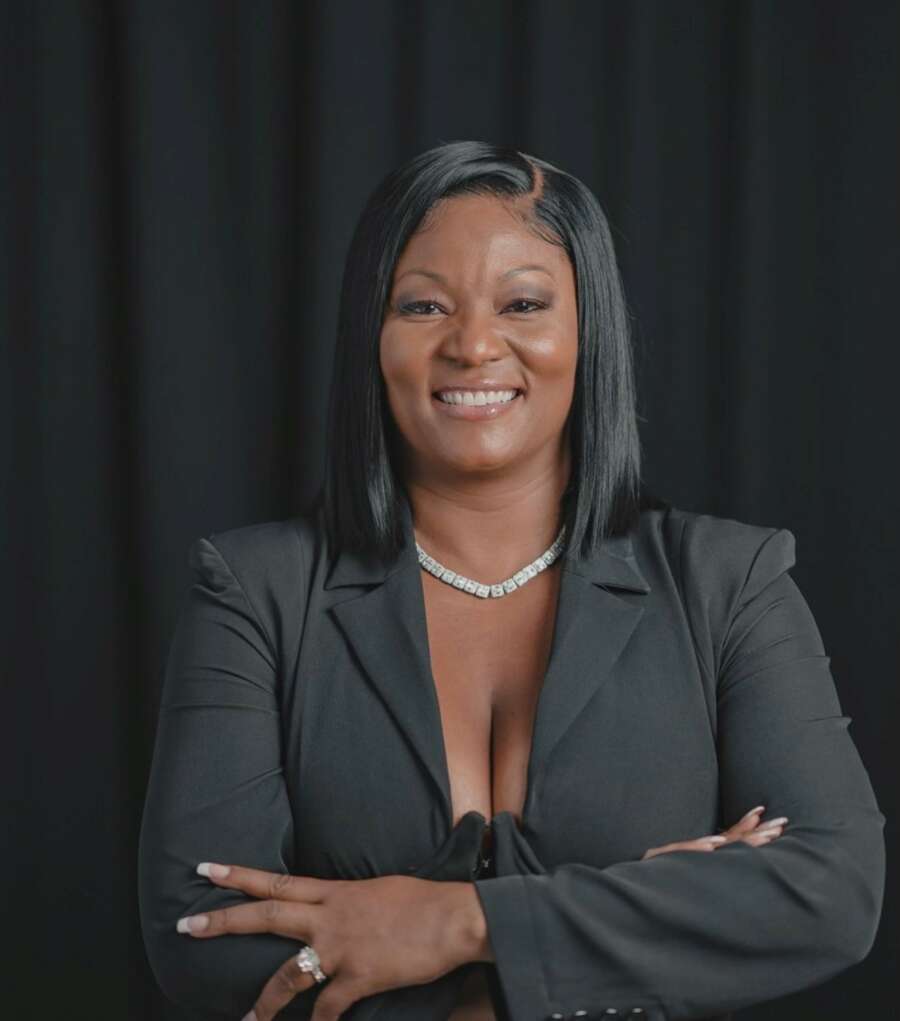By Mike Anthony-Newstime
In deciding to support UConn student-athletes for generations to come with the largest athletic donation in the university history, Trisha Bailey recognized the immeasurable value of her own experience as a member of the Huskies’ track team in the 1990s.
She came from abject poverty as a child in Jamaica, and from meager resources as a Hartford teenager. Her time in Storrs was the gateway to global entrepreneurial success and immense wealth, a chunk of which she is now putting toward UConn’s latest facilities project.
“UConn gave me my first opportunity in life,” said Bailey, who arrived in Storrs in 1995 after graduating from Weaver High in Hartford. “So for me, it’s greater than simply a gift and bigger than a building in my name. It was the start of my life. They took a chance on the talent I didn’t necessarily see and they believed I would take advantage of the opportunities that were given me. And I have, with the blessings of God.”
Bailey’s donation — exact amount unspecified, by her request — is the lead gift toward a $60 million renovation and expansion of Greer Fieldhouse, where she spent so much time in training as a sprinter and middle-distance runner while a UConn student.
Construction on the Bailey Student Athlete Success Center, an 80,000-square foot training and academic support facility that will house six Olympic sports programs, is expected to begin in fall 2023.
In the past two years, facilities for baseball, softball and soccer have opened, just over the hill from the elite basketball and football facilities that came before them. Hockey’s $70 million Toscano Family Ice Forum will open in January.
Soon, men’s and women’s track and field and cross country, women’s rowing, women’s swimming and diving, women’s tennis and field hockey will have a new home. The Bailey Center will have space devoted to offices, strength and conditioning, academics, mental health, nutrition, locker rooms and more.
“It shows great leadership,” athletic director David Benedict said of the donation. “It’s transformational in nature. Not just the fact that it’s the largest gift in history, but an ability to raise the bar with these types of leadership gifts. The fact that it’s coming from an alum and a former athlete, I think it’s spectacular. Those things speak really well of the institution and your alums and how they felt about their experience and their engagement and desire to continue to help the university.”
Greer Fieldhouse, historic in that it has long been the home of track and field and was the home for basketball in another era, will continue to exist within the new building’s walls.
Bailey is the latest former student-athlete to lead such a project, joining Peter Werth (basketball and beyond), Doug Elliott (baseball), Tony Rizza (soccer and performance center). Dan Toscano, a UConn graduate and the chair of the board of trustees, is the lead donor for the hockey arena.
The largest announced donation is the $7.5 million Werth gave toward construction of basketball’s Werth Champions Center. Rizza gave $8 million, in two separate pledges, toward the performance center and Morrone Stadium. Other single donations, kept private, have surpassed that. Bailey’s gift is more than all of them. It is also the largest single donation ever made by a UConn alum to the university.
“Years ago, before I was in the financial space that I’m in now, I used to say that I can’t wait to donate,” Bailey said. “You get phone calls trying to raise money for the endowment. I couldn’t wait to give back to UConn because of what they gave me. That was always in the vision. I just didn’t realize it was this type of vision, though. I said, ‘This is what I can do.’ And they said, really?”
“It’s massive,” Benedict said.
UConn this weekend will welcome back 400-plus female student-athletes for a celebration of the 50th anniversary of Title IX. A reception Saturday night — in the Fieldhouse — will feature several speakers, including Renee Montgomery, former women’s basketball player and part owner of the WNBA’s Atlanta Dream; new UConn president Radenka Maric; and Big East commissioner Val Ackerman.
Bailey, who made her fortune primarily in the medical equipment industry and, more recently, in commercial real estate, will speak, too. She will be making just her second return to campus since graduating 23 years ago. The first visit came earlier this year, when she began a conversation with athletic department leadership about the possibility of making a substantial donation.
“It’s a flood of emotions,” Bailey said. “More than you could imagine. The program was always there for me, the staff. For me to give back so they can continue the tradition of supporting the kids on the field and off, it does something to my soul.”
When UConn put as many as eight sports up for elimination in a 2000 effort to reduce its athletic deficit, Bailey donated $500,000 to the men’s and women’s track programs, a huge step toward preserving both.
“That’s how I re-formed a relationship with the university,” she said.
UConn months later announced it would cut four sports — women’s rowing, men’s cross country, men’s swimming and diving, men’s tennis. UConn later reinstated women’s rowing after a federal court ruled that the sport’s elimination would violate Title IX, which protects women’s rights and opportunities in areas of education and athletics.
Bailey, 45, lives in Orlando. Her company, Bailey’s Medical Equipment & Supplies, has branched out to include Bailey’s Pharmacies, with locations in Florida, Georgia, Tennessee, Texas — and soon East Hartford. Her commercial real estate dealings are both international and domestic.
She was a millionaire by age 35 and is on track to become a billionaire. With a net worth of $650-700 million, Bailey is one of the richest Black women in America. Bailey and her companies are among the global leaders in the medical equipment industry.
“I’m the wealthiest woman in the history of Jamaica,” Bailey said. “I just found that out a few weeks ago. So, that’s pretty cool.”
Her autobiography, “Unbroken,” comes out in summer 2023. It tells the story of her life and details how she overcame specific struggles, including physical abuse by a man, to “create my own yes.”
Bailey, a mother of five, owns half an island off the coast of Jamaica and is building a resort. She is currently shopping for a jet. She was the first Black woman to own commercial real estate property in the Florida towns of Vero Beach and Edgewood. She owns the largest equestrian farm in Florida.
Bailey, a state open 800 meter champion while at Weaver, graduated from UConn in 1999 with a degree in human development and family relations. She worked for several years as a stock broker in Hartford, soon started a recruiting company, and went on to earn an MBA and a doctorate (in management and organizational leadership with a concentration in finance) from the University of Phoenix. She also has certifications from the University of Kentucky (pulmonary) and NYU (cardiology treatment).
She grew up in Jamaica without electricity or running water. She would walk seven miles of dirt roads to school every morning. She moved to Hartford as a 13-year-old eighth grader with her sister, shortly after her mother, Gloria, and her stepfather made the move.
“It was a better life,” she said. “Even though we were in these apartment buildings that are as low-income as you can imagine — we lived in a one-bedroom apartment, and my sister and I slept on the pullout sofa — for me, it was, ‘OK, I have electricity, I don’t have to go outside to use the bathroom.’ I was in luxury land. I didn’t know at the time that we were not rich.”
She’s rich now.
Bailey is the mother of four biological children. Her oldest daughter, 24, is a cousin she adopted in order to bring to America for educational opportunities. Bailey has been active with charity, donating more than $10 million to Orlando-area initiatives. She has started food drives in cities where she has pharmacies, keeping in mind that the first Christmas gift she ever received was a doll from a toy drive at age 13.
Now her name will be on front of a building that is an epicenter for student-athlete experience at her alma mater. At UConn, Bailey was befriended and mentored by many, including track coaches and longtime associate AD and senior woman administrator Pat Babcock.
“I had so much support while I was there, on and off the track, in areas that you wouldn’t imagine that a university or staff cares enough to embrace,” Bailey said. “I feel like I gained a couple moms while I was there.”
The key to success she might share with kids coming out of Hartford? Out of UConn?
“Always be disciplined, work very hard in every single thing they do,” Bailey said. “When you put all you effort, and when you’re intentional with your efforts, what will naturally happen is you’ll find what you truly love. You’ll find your purpose. Once you find your purpose, it’s no longer work. You’ll be in blissful heaven as you’re working and building your career.”


